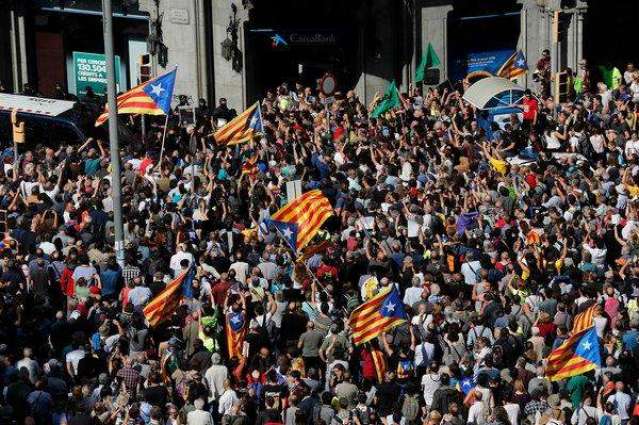Thousands of people took to the streets of Barcelona on the weekend and Monday to mark the first anniversary of the Catalan independence referendum, demonstrating that even a year after the vote a divide between the unionist and pro-independence camps and related legal, political and economic uncertainty show no sign of abating.
BRUSSELS (Pakistan Point News / Sputnik - 03rd October, 2018) Thousands of people took to the streets of Barcelona on the weekend and Monday to mark the first anniversary of the Catalan independence referendum, demonstrating that even a year after the vote a divide between the unionist and pro-independence camps and related legal, political and economic uncertainty show no sign of abating.
One year ago, on October 1, 2017, Catalonia held an independence referendum, even though the Constitutional Court ruled that it breached the Spanish constitution and therefore was illegal. As many as 92 percent of the voters supported independence but turnout was only 43 percent since it was boycotted by those opposing independence and fearing violence.
The Catalan parliament declared independence on October 27, 2017, which resulted in the Spanish government imposing direct rule on Catalonia, dismissing the regional government. The Catalan parliament was dissolved and fresh elections called, with regional leaders charged with sedition and rebellion.
On Monday, some 180,000 people took part in the demonstrations in the regional capital of Barcelona alone, according to the Catalan police. There was also a pro-Spain rally in the city and the police had to keep separatists and unionists apart.
Crowds of pro-independence ultras filled the city's central square, waving the Catalan yellow, red and blue flags used by independence supporters. They chanted "First of October, no forgiving, no forgetting" and "Independence. Freedom for all political prisoners!" in a reference to last year's referendum, which saw a police crackdown on pro-independence activists. A group of protesters that gathered at the Square of Catalonia unfolded a large banner, which read "Self-determination is a human right" in English.
The march was organized by a number of local pro-independence groups and movements, including the ones commonly known as the Committees for the Defense of the Republic (CDR).
After formal speeches, the rallies turned violent with protesters throwing bottles, cans and eggs at policemen.
The police officers in riot gear used force to disperse the crowd that managed to get close to the parliament building in Barcelona. In a separate incident in the town of Girona, protesters stormed a government office and tore down the Spanish flag, replacing it with the Catalan one.
Hundreds of people briefly paralyzed traffic in some areas of the region, as well as the high-speed train link with France. Catalonia has witnessed major protests for three days in a row.
From Belgium, where he lives in self-exile, deposed Catalan President Carles Puigdemont sent a video message to his supporters, expressing his "indignation at the violence of the police showing the impotence of Madrid."
"I thank all the people who made the October 1 referendum possible. They [Madrid] thought they could prevent the inevitable. We won't be diverted from the only possible way to live in a full democracy: the achievement of the Catalan Republic and its international recognition," Puigdemont stated.
JUNQUERAS' CANDIDACY FOR EUROPEAN ELECTIONS
Puigdemont's message from Brussels was a reminder that multiple regional politicians were charged with rebellion, sedition and misuse of public funds by the Spanish Supreme Court following the referendum. Among them were Puigdemont himself and a few ministers who fled to Belgium.
Oriol Junqueras, the former vice president of Catalonia, and seven other Catalan ministers however were placed in custody. Several of the ministers were released on bail on December 4, but Junqueras and Interior Minister Joaquim Forn were remanded in custody.
At the December 21 regional elections, Junqueras was re-elected, and Catalan pro-independence parties retained an absolute parliamentary majority. Junqueras however was suspended as a member of the regional parliament by a Supreme Court judge on July 10.
On Monday, the imprisoned vice president of the short-lived republic of Catalonia, who spent today 332 days in preventive custody, declared from the prison that he would run in the 2019 European Parliament election.
"Presenting myself to Europe is the best way to denounce the democratic regression and the repression of the Spanish State ... After reflecting on it personally and sharing it with comrades who are suffering repression, I feel strongly to lead the Republican candidacy to the European elections of May 2019, as long as my party considers it," Junqueras wrote, as quoted by El Pais newspaper.
Junqueras stressed the need "to continue working to win and defend the rights and freedoms of Catalonia and all its citizens" and "internationalize the cause of freedom in Catalonia."
This week, in the plenary parliamentary session, Junqueras will be suspended, in order to comply with a Constitutional Court order ordering the suspension of the Catalan officials who have been prosecuted on rebellion charges.
FRANCE'S VALLS WILL RUN IN BARCELONA MAYORAL RACE
The next major electoral event in Catalonia, like the rest of Spain, will be municipal elections in May 2019, which will be held at the same time as the European Parliament election.
A strange element is that the former French Prime Minister Manuel Valls will be a candidate for the post of Barcelona mayor. He has already pledged to "quit politics" and remain in Barcelona if he loses the election.
He stated having "recovered [his] Spanish passport." Born in Barcelona in 1962, Valls grew up in Paris and was naturalized French at the age of 20.
Valls, who now has dual nationality, said he would resign as a member of the French parliament on Wednesday.
Valls - pro-Spain - is not believed to be a frontrunner in the mayoral race.
Since June 2015, Ada Colau has been mayor of Barcelona, the first woman to hold the office. Colau was one of the founding members and spokesperson for Plataforma de Afectados por la Hipoteca (PAH) (Platform for People Affected by Mortgages), which was set up in Barcelona in 2009 in response to the rise in evictions caused by unpaid mortgage loans and the collapse of the Spanish property market in the wake of the 2008 financial crisis. She seems to have considerable chances to be re-elected.
Roughly half the population of Catalonia believes in an independent republic. The other half remains pro-Spain and does not want independence. Most of the pro-Spain citizens live in Barcelona.
IS AN INDEPENDENT CATALONIA ECONOMICALLY VIABLE?
Many citizens do not want to express themselves, but many think about the implications of a full independence of Catalonia. In theory, this would bring back the tax revenues that are now collected by the central Madrid government, but there are many other economic implications.
First of all, if Catalonia left Spain, it would also leave the eurozone. Would Barcelona create a new currency? Based on what reserves?
The European Union obviously does not intend to encourage separatism as many EU nations themselves have internal difficulties with separatist regions.
Meanwhile, Catalonia-based companies have already shown their reluctance to join the fight for independence. From an industrial component producer to a biscuit-maker, their first market is Spain. Many companies are afraid of losing big and seeing their Spanish customers turn to other suppliers and have already resettled.
Ramon Almasque Gil, the director of a subsidiary of an Italian elevator maker, told Sputnik that that he had concerns about his business based near Barcelona selling its products to all Spanish provinces.
"I am Catalan, speak Catalan at home and I am sympathetic to the cause of independence. I had my doubts at the beginning, but it has gone too far now, and the rigid attitude of Madrid has turned many people against Spain, but it is true that I feel the danger for our business ... Will my customers still like me if Catalonia becomes independent? I am not sure. We have the reputation of being 'the rich' in Spain and this struggle for independence is badly perceived in other regions, not only in Madrid," he wondered.
Others, in contrast, stand for the independence cause and blame Europe for not supporting the relevant movement, pointing to double standards and the recognition of Kosovo's independence by many EU nations.
"The European Union is nowhere to be found because they don't really support true democracy and the will of independence of the Catalan people. They refuse to acknowledge Catalonia's quest for independence through a referendum, yet they recognize Kosovo as an independent state - which never had any referendum or vote. Kosovo was carved out of Serbia. The Catalan issue has not been brought up in the European parliament. What is Europe for then?!" Jose Aragall, a manager of a call center in Barcelona, told Sputnik.
Sputnik sent a request for comment to 54 Spanish (and Catalan) members of the European Parliament. Only Enrique Calvet Chambon of the Alliance of Liberals and Democrats for Europe has agreed to answer a few questions.
According to Chambon, who is an independent lawmaker close to the left major Spanish trade union UGT, there is "no possibility of negotiating with the Catalan putschists who are snatching away our Spanish constitutional rights."
He suggested that Madrid should present an urgent plan to "recover the civil rights of all Spanish citizens and to combat discriminatory supremacism."
"For me, and for the democrats, what is really at stake as a first priority is the protection and the recuperation of civil rights and liberties for millions of Spanish Catalans that suffer a racist totalitarian putsch with no reaction from our government in Madrid," Chambon stressed.
The lawmaker also touched upon economic ramifications of what he called the institutional crisis around Catalonia.
"People from Barcelona see now how companies leave the city every day and how tourism decreases. It is really sad for most citizens who just want to live in a prosperous and peaceful Europe. The Spanish government has to act immediately to solve this situation. We cannot speak of paralysis, this would be exaggerated. Lets say there is a slow deterioration," he argued.
So, tensions remain high in Catalonia, a year after the referendum, deemed illegal by Madrid but celebrated by independence-seeking Catalans.
The separatists managed a vital though narrow victory in the December regional election, but they have had difficulties retaining momentum this year. It is understandable. Most of their leaders are either in exile or in detention awaiting trial for their role in organizing the referendum and subsequent declaration of independence.




